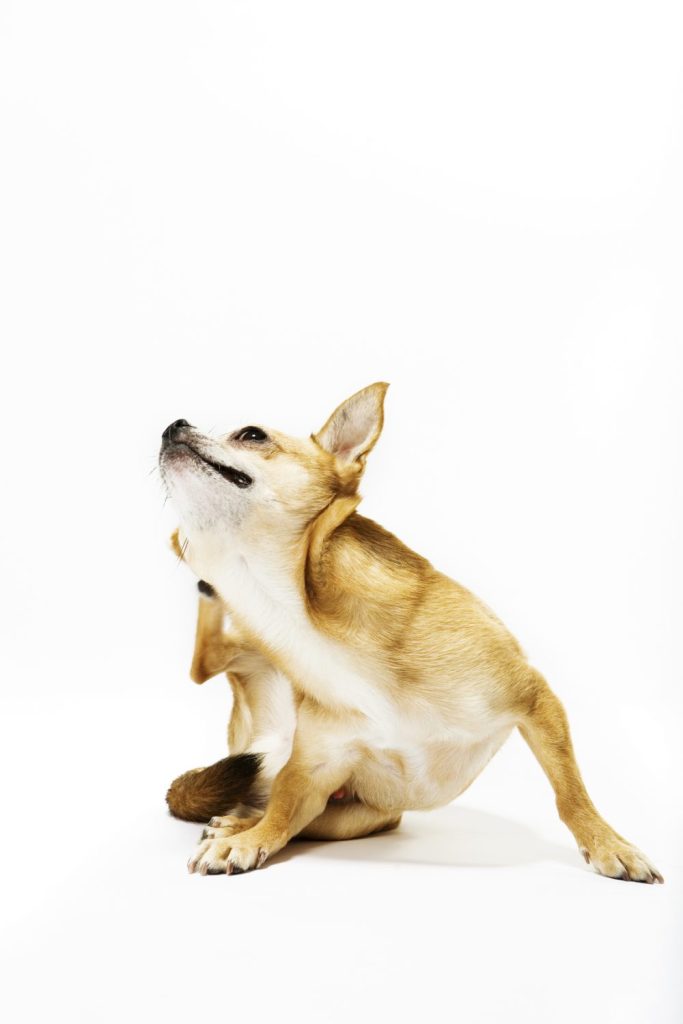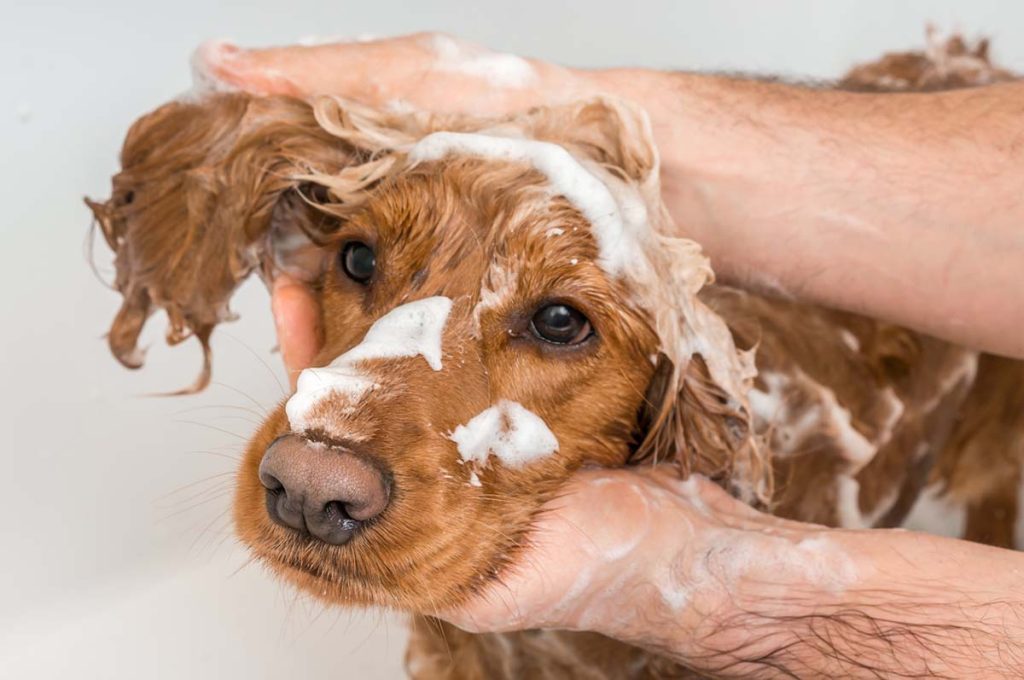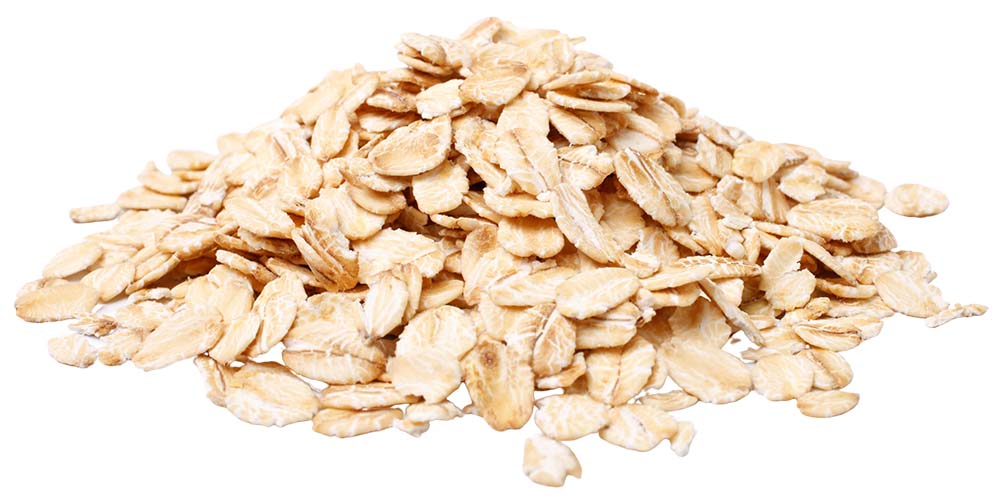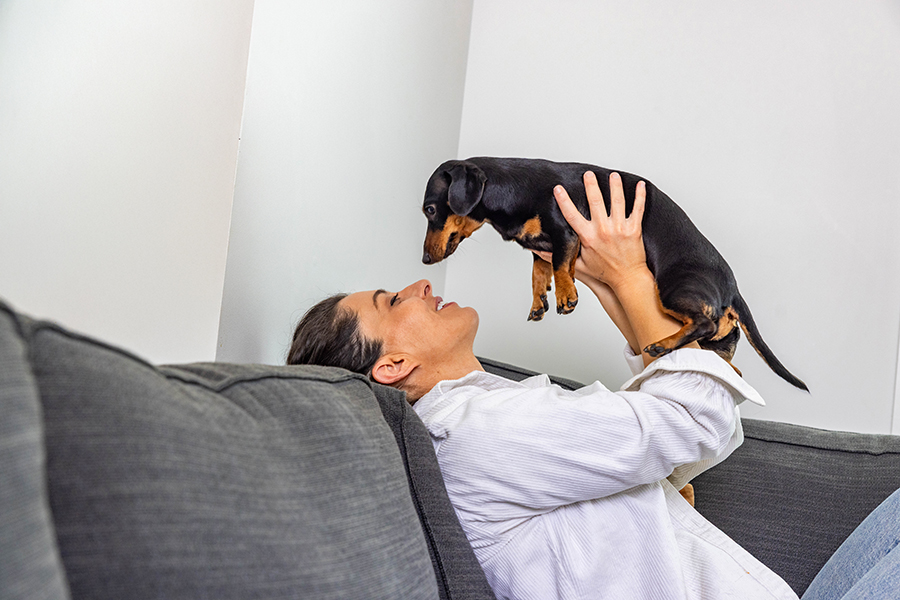How To Help Dogs With Dry Skin
Dry skin is a common condition for many dogs. Knowing how to identify the symptoms and causes of dry skin in dogs will help you figure out the best remedy.
Dry skin is a common condition for many dogs, and pet owners surely want to find a way to help. Knowing how to identify the symptoms and causes of dry skin and health conditions in dogs that can cause it will help you figure out the best remedy for your pup. This way you can help them squish the itch and get back to their happy, healthy selves.
Symptoms of Dry Skin in Dogs
A dog’s dry skin may not be obvious right away, especially if they have a thick coat or one that’s lighter in color making it hard to notice doggy dandruff. Aside from noticing them itching or seeing visible discomfort in your dog, symptoms of dry skin can include:
- Excessive itching, biting, or licking
- Scabs
- Hot spots (red, inflamed skin)
- Scooting
- Pet dander (skin cells shed by dogs, cats, and other animals with fur)
- Hair loss or bald spots

Causes of Dry Skin In Dogs
Different breeds of dogs have different skin and coats. Some dog breeds are more susceptible to conditions that cause dry skin than others. The general causes of dry skin are things like allergies, parasites, infections, and environmental factors like weather or too many baths.
Allergies
Dogs can have allergies just like humans. Allergic reactions in dogs can be triggered by food, environment, or by coming in contact with allergens like certain soaps. Itchy, flaky skin is one of the most commonly reported symptoms of allergies in dogs.
Food allergies can make dogs itchy around their mouth, ears, and paws. Environmental allergens for dogs can be seasonal and usually come from the great outdoors or from allergies to parasites.
Parasites
Aside from dust mites which can cause itching, irritation, and skin infections in dogs, there are other parasites that can be a problem for your dog’s skin. Itching and scratching from parasites can cause more skin problems for your dog, like hair loss and yeast infections.
Some dogs are actually allergic to parasites, combining two causes of dry skin in dogs into one. Dogs can be allergic to flea bites, a condition called flea allergy dermatitis (FAD) caused when your dog’s immune system is overwhelmed by the flea bites causing itching, hair loss, and irritated skin.
Mange is another skin disease in dogs caused by microscopic mites, some of which live just under a dog’s skin and some which live in their hair follicles.
Dog breeds that are more likely to have flea bite and dust mite allergies include pugs, retrievers, and terriers.
Parasites That Can Cause Skin Irritation in Dogs:
Infections
There are a few different things that can cause infections. Fungal infections in dogs are usually caused by contact with another animal carrying the fungus, environmental contact, or the overproduction of natural fungi in your dog’s body (yeast infections).
Hormone Levels
One cause of dry skin in dogs is a condition called Cushing’s Disease. This is when a dog’s body produces too much of the hormone cortisol. Veterinarians call cortisol the body’s natural steroid, helping the body to adapt during times of stress and to fight off infections and bacteria. Too much cortisol in dogs, however, can cause itching as a stress response and hair loss as a result of itching.
Seasonal Changes
Changes in humidity levels and dry air can cause dry skin leading to flaking, dandruff, and itchy skin for your dog. On the opposite side of things, high humidity levels and hot weather can also cause dogs to be extra itchy. Dogs can also have seasonal allergies to things like tree and grass pollens, ragweed, mold, and mildew.
Excessive Bathing
All pet owners want a good-smelling pup, but too many baths aren’t good for your pet’s skin. While you also don’t want to allow the buildup of too much dirt or dust in your dog’s coat, bathing them too often can strip their skin and fur of the natural oils they need to maintain healthy skin. You might also want to consider changing the dog shampoo you use since it could also be causing your dog’s skin to dry out.
How To Treat Your Dog’s Dry Skin

There are a number of different approaches you can try at home for treating your dog’s dry skin, some of them as simple as changing up their diet! Here are the best methods for relieving dry skin in dogs and helping them get rid of the itch.
Try Skin Supplements
Supplements can be a huge help in managing your dog’s skin conditions. They can be a great addition to your dog’s diet so they get extra vitamins and minerals. Skins and coat supplements for dogs are designed to help your furry friend manage uncomfortable skin issues related to seasonal allergies.
Get A Humidifier
Dry, cold weather and low humidity can cause your dog’s skin to dry out. Humidifiers can help prevent dry skin by reintroducing moisture into the air and rehydrating skin, hair, and fur that can become dry and itchy without it.
Apply Coconut Oil
Coconut oil is a great topical aid for dry skin for both people and pups. It’s rich in vitamin E which soothes and hydrates skin, and it also helps the skin to create a natural barrier to retain moisture and avoid dry air or other irritants.
Try Oatmeal Baths

Just like for humans who have dry, irritated skin, an oatmeal bath for dogs can help soothe dryness and replenish moisture in your dog’s skin.
Use finely ground oatmeal mixed with warm water to make a paste and use this as a shampoo for your dog, gently massaging it into their skin and coat and rinsing well. Try to keep them from drinking the water!
Adjust Your Dog’s Diet
Allergies aren’t the only part of your dog’s diet that can affect their skin. It’s also possible your dog’s skin problems are a result of nutritional deficiencies. High-quality diets rich in fish oil and omega-3 fatty acids can make a positive difference in your dog’s skin health. These essential nutrients help your dog produce natural oils necessary for maintaining healthy skin and coat.
Talk To Your Vet
If you’ve tried different at-home remedies to help your dog and their skin issues continue to persist, it may be time to try traditional veterinary medicine. A veterinary dermatologist can recommend the right tests to determine the cause of your dog’s skin problems and the best ways for pet parents to help their pups.
This content is for informational use only and does not replace professional nutrition and/or medical advice, diagnosis, or treatment. It is not a substitute for and should not be relied upon for specific nutrition and/or medical recommendations. Please talk with your veterinarian about any questions or concerns.
Rodrigues Hoffmann, Aline, Adam P. Patterson, Alison Diesel, Sara D. Lawhon, Hoai Jaclyn Ly, Christine Elkins Stephenson, Joanne Mansell, et al. 2014. “The Skin Microbiome in Healthy and Allergic Dogs.” Edited by Jose Luis Balcazar. PLoS ONE 9 (1): e83197. https://doi.org/10.1371/journal.pone.0083197.
Preis, Melanie Winderlich. 2021. “Cushing’s Syndrome in Dogs.” WebMD. September 6, 2021. https://www.webmd.com/pets/dogs/cushings-syndrome-dogs.
“Demodectic Mange in Dogs.” n.d. Vca_corporate. https://vcahospitals.com/know-your-pet/mange-demodectic-in-dogs.
“Flea Allergy Dermatitis in Dogs.” n.d. Vca_corporate. https://vcahospitals.com/know-your-pet/allergy-flea-allergy-dermatitis-in-dogs.
Check out our Healthy Skin & Coat Treats Bundle








